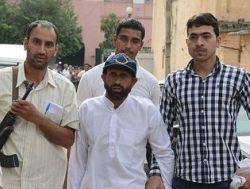 | « Back to article | Print this article |
 Sayyed Liyaqat Shah, arrested in 2013 by Delhi police on charges of being a terrorist of banned outfit Hizbul Mujahideen and planning attacks in New Delhi, has sought his discharge before a Delhi court, saying no evidence has been found against him by the NIA.
Sayyed Liyaqat Shah, arrested in 2013 by Delhi police on charges of being a terrorist of banned outfit Hizbul Mujahideen and planning attacks in New Delhi, has sought his discharge before a Delhi court, saying no evidence has been found against him by the NIA.
In his plea, Shah alleged that he was falsely implicated by Delhi police's Special Cell but after conducting a thorough probe in the matter, the National Investigation Agency has given him a clean chit.
"The NIA after investigation found it to be a false case registered against the applicant (Liyaqat)....no evidence was found against the applicant to file charge sheet," the plea filed before District Judge Amar Nath said.
"It is, therefore, most respectfully prayed that the applicant may kindly be discharged from the above mentioned case in the interest of justice," the plea, filed through advocate Asim Ali, said.
The court has asked the probe agency to its file response on the application on September 21, the date fixed for considering NIA's charge sheet giving Liyaqat a clean chit.
In its charge sheet, NIA has named absconder Sabir Khan Pathan as the main accused, who had allegedly planted weapons on Liyaqat to project him as a terrorist.
The agency, while absolving Liyaqat of terror charges in its charge sheet, had submitted its report to the Home Ministry seeking permission to investigate the roles of some Delhi police officials for allegedly "conspiring" to target Liyaqat.
Liyaqat was arrested by the Special Cell on March 20, 2013 when he was returning from Pakistan-occupied Kashmir to the KashmirValley via Nepal at Saunali border with his wife and children.
The special cell of Delhi police had alleged that Liyaqat had come to carry out terror strikes in the national capital.